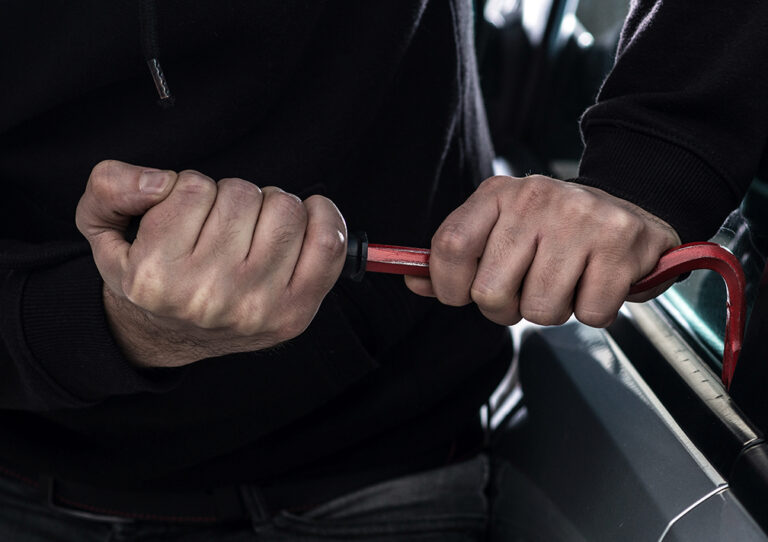Brad Klepper has been catching up on traveling recently and wasn’t able to provide a column for Sept. 15, 2021, edition of The Trucker. We hope you enjoy this article, originally published in September 2019.
I was at a truck show recently when a driver, obviously distraught, approached me with a question. It turns out the driver’s truck had been broken into over the weekend, and he wanted to know what was going to happen with getting his belongings replaced.
The truck was parked next to his house, on his property, while he and his wife were out of town for a wedding. The driver discovered his truck had been broken into when he returned the following night. According to the driver, the thieves took his microwave, TV, flux capacitor for the truck (it was a late model truck) and some additional personal belongings. The driver called the police, who said there was not much they could do because of the lack of evidence, but they did write the incident up as a burglary.
The driver was understandably upset and wanted to know if he was just out of luck and would have to replace all his property out of his own pocket. The driver also wanted to know why the theft was written up as burglary and what, exactly, burglary meant.
Common law describes burglary as “the breaking and entering the house of another in the nighttime, with intent to commit a felony therein, whether the felony be actually committed or not.”
Most states have modified the common law definition and codified it into state laws to ensure punishment of the crime. The expansion of the definition has resulted in the “house” not needing to be a dwelling or even a building; it may include a vehicle such as a car, truck, boat, etc. The “breaking” does not usually mean physical breaking of property and the entry need not be at night. The intent to commit a felony has become the intent to commit any crime.
Here in Oklahoma, we have first-degree and second-degree burglary.
First-degree burglary applies to every person who breaks into and enters the dwelling house of another, in which there is at the time some human being, with intent to commit some crime therein, either (1) by forcibly bursting or breaking the wall or an outer door, window or shutter of a window of such house, or the lock or bolts of such door, or the fastening of such window or shutter; or (2) by breaking in any other manner, being armed with a dangerous weapon or being assisted or aided by one or more confederates then actually present; or (3) by unlocking an outer door by means of false keys or by picking the lock thereof, or by lifting a latch or opening a window. Anyone who does any of that is guilty of burglary in the first degree.
Second-degree burglary is when someone breaks and enters any building or any part of any building, room, booth, tent, railroad car, automobile, truck, trailer, vessel or other structure or erection in which any property is kept, or breaks into or forcibly opens any coin-operated or vending machine or device with intent to steal any property therein or to commit any felony.
Is the driver out of luck on getting his property replaced? The answer is “it depends.” The answer really boils down to whether the driver has renters’ or homeowners’ insurance. If you have not done so recently, take a look at your policy or call your insurance agent to find out what your policy covers and what your deductible would be should you find yourself in a similar situation to the aforementioned fellow.
If you have vehicle insurance on your car or truck, you may be able to file the theft on that policy. Ask your insurance agent if you are covered. When making a claim, the best thing you can do is provide a copy of the police report, along with a description of what was stolen. In addition, if you can find the receipts for the personal items that were stolen, include them with your claim. This is a hassle, I know, but it will help your claim. For what it is worth, you may want to start taking pictures of the receipts for the things you would want replaced in this type of situation, and keep the photos on your phone. That way they are always handy, and you don’t have to keep all the paper receipts.
Another way to protect your property is to take a video or photos of everything in your truck/house/apartment showing everything you own. Insurance companies want and need proof of what was stolen so they can determine what to pay you. Trust me, they will not just take your word for it. Again, you can do this on your phone, and if you utilize the cloud, you don’t need to worry about losing the information.
Finally, if you are a company driver you may also want to check with your employer, if it was their truck, to see if their insurance covers anything, like your loss of property.
As you can imagine, the driver I was talking to was angry about the entire episode and said something along the lines of, “If I had been there and caught whoever did this, man, they would be sorry….”
Of course, the best thing that happened in this instance is that the driver was NOT there to confront the criminals when they broke into his truck. They might have been armed, under the influence of drugs or alcohol, or simply a group of kids with too much time on their hands. Nothing good is going to come of such a confrontation. At the end of the day, all they took was stuff — and “stuff” is replaceable.
Brad Klepper is president of Interstate Trucker Ltd., a law firm entirely dedicated to legal defense of the nation’s commercial drivers. Interstate Trucker represents truck drivers throughout the 48 states on both moving and nonmoving violations. Klepper is also president of Driver’s Legal Plan, which allows member drivers access to his firm’s services at discounted rates. He is a lawyer who has focused on transportation law and the trucking industry in particular. He works to answer legal questions about trucking and life over the road.
Brad Klepper is president of Interstate Trucker Ltd. and is also president of Driver’s Legal Plan, which allows member drivers access to services at discounted rates. For more information, contact him at (800) 333-DRIVE (3748) or interstatetrucker.com and driverslegalplan.com.
Brad Klepper is a regular contributor to The Trucker, providing valuable information for drivers and motor carriers. He is also president of Interstate Trucker Ltd., a law firm entirely dedicated to legal defense of the nation’s commercial drivers. Brad is also president of Driver’s Legal Plan, which allows member drivers access to his firm’s services at discounted rates.











